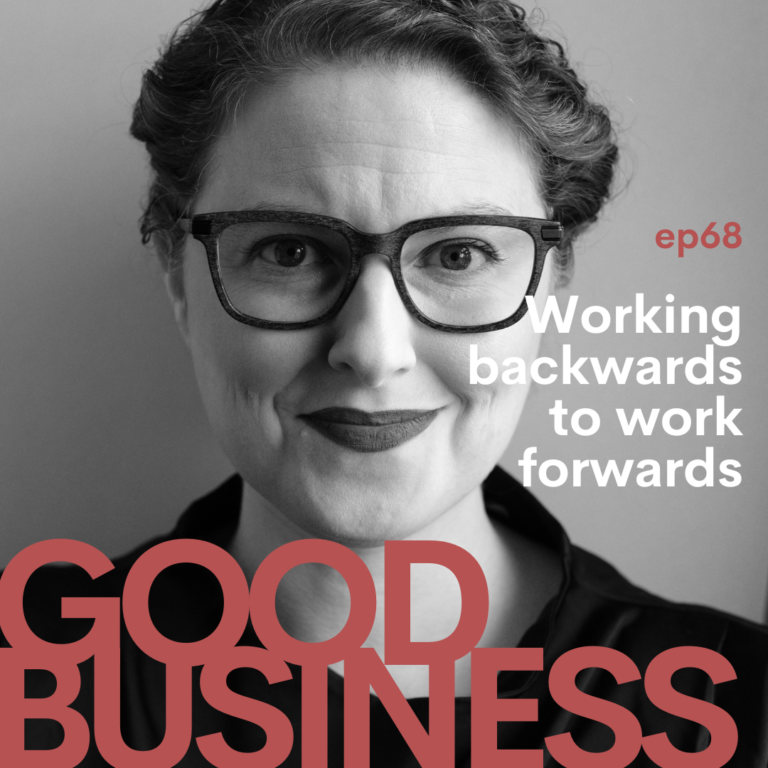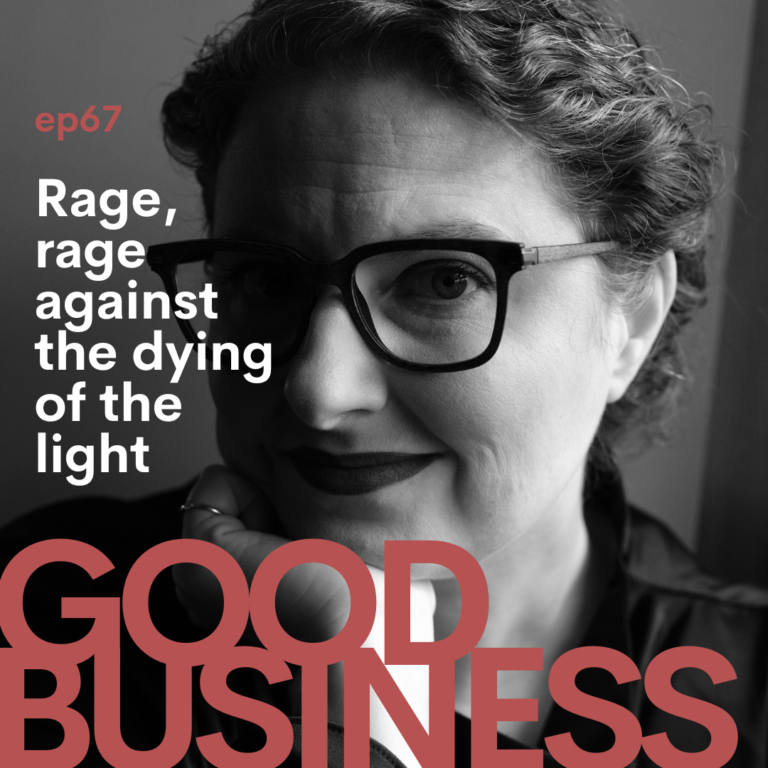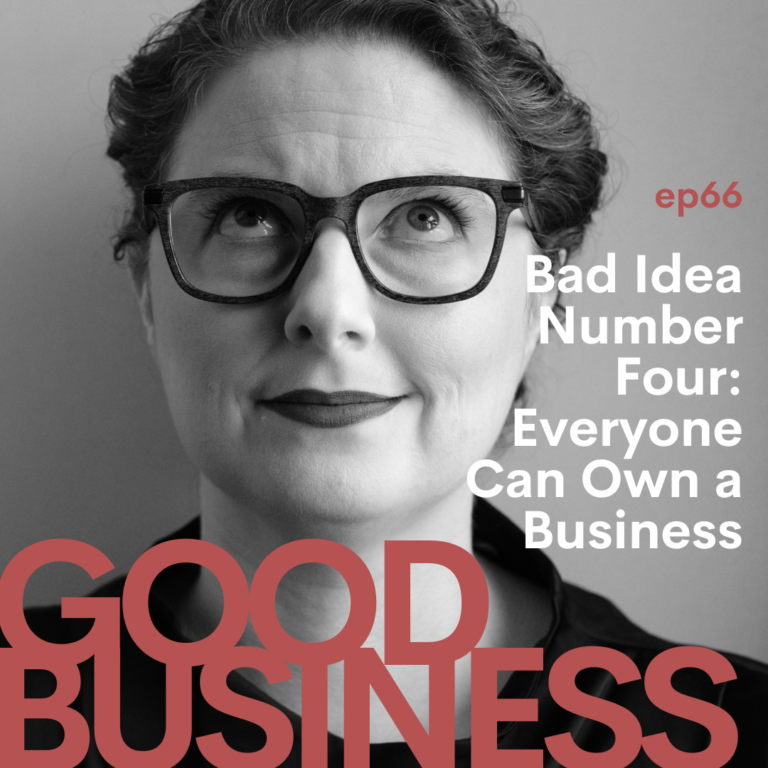Do you know what your work is actually worth? How do you answer when someone asks why they should pay your rates?
Episode Transcript:
I’m Illana Burk, CEO of Your Life’s Workshop, coach to entrepreneurs and solopreneurs across dozens of industries and host of Good Business. With nearly 20 years experience helping hundreds of clients create profitable, ethically driven and sustainable businesses based on their life’s work, I’m here to teach you how to do great work, make great money, and make a positive impact without feeling like you need a shower afterwards.
Well, hi everybody. It’s been a long time. I’m so excited to be back in the saddle and podcasting again, and coming to all of you with all kinds of fun, new stuff. Today, I want to jump right in and talk about something that’s really, really important to me. And that is how we value our worth. I’ve been really amazed at how people talk about worth in the online space and in the business space. We tend to not really think about worth. Especially, I mean honestly, especially as women like we don’t think about worth in the same way that
the men do. I mean, We really. It’s it’s an interesting thing. You know, how. Women. Are in this constant state of feeling like we have to prove something, right? Like we have to stand up for ourselves. We have to prove our worth. We have to show people that we have the same value than men do. And that’s, it’s such an incredible waste of time.
And. Today. I want to talk about how I think about my own worth and how I encourage clients to think about theirs and how I encourage you to think about yours. So. This all started with a post and a Facebook group that I’m in with a bunch of very impressive, incredible women. And they, somebody asked, what do you, how do you handle it, when someone asks, why are you worth a premium rate?
It’s a question that comes up a lot. You know that if you’re a service provider, People are going to ask you that, you know, the, like the tire kickers, the, you know, the people who are like, they really want the result of what you’re selling, but they don’t really want to pay the price for it. So.
They really want, like, basically what they’re asking for is a guarantee. How can you guarantee I’m going to not feel like crap about paying your premium prices? So everybody weighed in, in the group, and gave lots of really good advice. You know, this is like a really experienced group of business owners. And you know, the answers were like, the results are commensurate with my experience and price tag, you know, like it’s.
Or the price tag, excuse me, as the, is commensurate with my experience and and outcomes. And you know, there’s lots of that, right. My answer was simply that I say, I’m not.
That got a lot of people curious because the answer from the original poster was, “Wait. So you actually tell people that you’re not worth a premium.” And I’m like, yeah, I actually do. Because when someone asks about that, they’re not really asking. For you to reassure them there, it’s a power play they’re asking for you to sing for your supper, right? Like they’re basically, you know, it’s kind of like dance monkey dance, you know, it’s that.
They’re trying to put you on your heels. It’s it’s usually an ego move. It’s usually a power play it’s usually designed to make you tap dance in front of them of like, well, I do this and I do that and look at my results. Well, now you’ve completely lost all of the power in that dynamic because now.
You’re so busy trying to prove something that you already knew to begin with. That you’ve lost track of what the other person needs, and now they don’t have to be vulnerable. They don’t have to share. They don’t have to. Ever. Decide that what you gave them was worth it, because now you’ve just told them that here’s all the ways in which you can measure me.
Here’s all the ways you can size me up. And when you hand over that kind of power to somebody who, if they’re the type to even ask that question to begin with, there’s a really good chance that they’re not really in a. Learning Headspace. Right? Because they’re, if they’re that fearful, they’re that scared and they’re that worried that they’re not going to get their money’s worth.
They’re already trying to like sabotage the whole dynamic, which is what lots of people in the thread said was like, that’s just a big red flag. For me, that’s not the red flag for me that tells me that somebody is vulnerable, a little insecure, probably fearful probably has been burned. Sometimes you can usually tell how someone asks if it’s like, if they’re really worried about getting their money’s worth or if they are.
Doing what I just described basically. And usually it’s kind of a hybrid of both. So my stock answer is I’m not like there’s nothing that I can teach you that you can’t readily find on the internet. Right there. We have just It’s an incredible amount of knowledge at your fingertips all the time.
There’s nothing that I’m going to say or do that’s going to be inherently unique or rainbow. Like, I’m not going to give you the secrets to the universe. So if that’s how you measure premium pricing and its value. So you’re going to be disappointed. I’m not your gal. But the real worth of what I do is in helping you understand.
What you actually need right now, so that you implement the stuff you already know you’re supposed to be doing. That’s the difference. So it’s like, that’s my magic, special sauce. That’s how I take everything I’ve learned in all my experience and all of my outcomes, all things that they already know before they ask the question. If they got far enough to be sitting on a call with you or sitting in front of you.
Asking you that very question of prove it, right? Why should I, why should I pay your high prices? Or your premium, whatever your prices are. It doesn’t even have to be high. People will ask that stupid question, whether you charge $20 an hour or 200. But if they’re sitting there, they already know you’re worth it. They already got that far. Right. They already know about all your experience. They already know about your outcomes. They already read all your testimonials and they just want to watch you spin your DIYers.
You know, they wind you up and then let you spend like a top. It’s a pretty narcissistic move. But it doesn’t mean that the person asking is a narcissist. It means that they learned it from one. Now not everybody realizes that that’s what they’re doing, that what they’re doing is that toxic. So. You let him spin. Right. And you don’t bite. I mean, and that’s has always been my move. It’s like just don’t bite.
If somebody is asking for you to hand over your power to them. So that they can play with it. Like it’s a toy. And then make your life miserable as a result. You can’t get good results with clients. If you hand over power to them right away, they need you to hold the power in that dynamic in order to get the results that you promised. So if I’m ever going to have any hope of having great results with clients, I have to hold on to that.
I can’t just hand it over and that’s basically true. For any industry. The idea that the customer is always right, that you let someone else dictate how to deliver your work. Is ridiculous. It’s absolutely fucking antiquated and ridiculous. If somebody comes to me for business coaching, they don’t know better than me. They don’t, they don’t, there might be many things they know that are.
I don’t know, more, better, whatever. But when it comes to what I do, why they’re there, there’s no way that they know how to measure their success yet because we haven’t done the work yet. So there’s absolutely nothing I can say. That’s going to feel satisfying other than, you know what, I’m not worth it.
I’m not. If you’re going on. Cold metrics alone that I can give you before we’ve even begun. Then there’s absolutely no way I’m ever going to be able to give you something that you can measure an ROI on or, or measure your sense of success. It’s something that at some point your buying decision is going to have to go on faith. I can tell you that.
I’m really good at getting people to implement. And that’s something that is unique. If somebody comes across me and they’re struggling, it’s often not because they don’t know what to do, it’s that they can’t get themselves to do it because they don’t know how to make good decisions. I can help you do that.
If that sounds good. I’m your gal. Otherwise have a nice life. And if they keep pushing, then I know that it’s not a fit. If they keep pushing going, that’s a nonsense answer. Any kind of mansplaining. Whether it’s a woman or a man saying it’s the same thing. It’s mansplaining bullshit. Right. That kind of like, oh, I’m going to keep trying to put you on your heels.
No. Thank you. Then that’s a hard pass, but usually what happens is the person backs down. They cut, it makes them sort of chuckle a little bit like, wait, you’re going to actually tell me that. You’re not worth it. Like, yeah. I am not going to play. I’m not going to sit in front of anybody and prove my worth.
My worth is not something that’s in question. If I let someone question it. It’s the first step in eroding, a level of trust and power dynamics that you’ll never get back. So if I let them question it. If I let that pass. If I play that game that they’ve laid out in front of me. Then I’m losing, I’m not doing my job.
So, all I can do is go like I’m not gonna play my, my worth. Your worth is something that. You have to know going into that call and not let them question it, not let them take that away. So, whether it’s a call or a customer or a complaint, or the guy at the grocery store. You know, You got to walk through your work and your world. Like you already know what your worth is.
Otherwise, you just handing power out left and right. If you’re tap dancing for your supper, if you’re letting people put you in a position where you have to explain why you’ve chosen to move through the world the way that you have, whether it’s, how, about how much you charge or how you carry yourself, you’re always going to be letting someone else set your prices. You’re always going to be letting someone else set your value. You’re always going to be letting someone else set your worth. So don’t do that. Instead, look for a way that you can take your toys and go home. Look for the ways in which you can say, I know what you’re asking for here, and I’m not going to play.
Right. But in a way that keeps them engaged. Because what happens most of the time for me is the person goes, huh? What a great answer. And then we get to have a real conversation. And that person, if I would have said, well, you know, my outcomes are commensurate with my experience. Right. Um, they would have been like, Oh, okay, well, Hmm.
I’ll think about it. But instead, I’m still having a conversation with them because at the very least I made them laugh. Because when someone says, why are you worth premium rates? You say it’s easy. I’m not. They immediately go What?
So now I’m not the one on my heels. Now I’ve knocked them back. Now they’re the ones kind of going, Whoa, I did not expect that. You know, I’m keeping them a little off balance and that’s with intention because it will help them get the outcome they want and need from me.
All right, everybody. That’s it for today. Thank you so much for tuning in. We will be publishing way more often from here forward and I can’t wait to see you again soon.
All right, everybody. Bye.
More Episodes
GB68: Working backwards to work forwards
Welcome back to the Good Business Podcast. I'm your host, Illana Burk. Today, we're diving into one of my favorite productivity tools, which, amusingly enough, isn't really a productivity tool at all. As a business coach,...
GB67: Rage, rage against the dying of the light
Welcome back to the Good Business Podcast. Today, we're talking about visibility. It's a big theme for me at the moment, as this week marks the start of "Go for the Know," my very new, very exciting, totally free program for...
Bad Idea Number Four: Everyone Can Own a Business | GB66
In this episode, I debunk the myth that everyone should own a business. Entrepreneurship requires a high tolerance for risk and can deeply affect personal relationships. Success in business isn't just about skills, but about...
Why we need to put our best stuff out for free | GB65
In this episode, we talk about why it is the right thing to do to give out your work, your very best work, generously, and everywhere you can, why special and generous content wins, the pitfalls of marketing funnels, and how...
How to give feedback | GB64
In this episode, we’re tackling the often-dreaded task of giving feedback. We all know how important feedback is for growth, but delivering it in a constructive and respectful way can be a challenge.
Join us as we explore the art of giving feedback without being a jerk. We’ll discuss why feelings matter in business, the four key steps to giving effective feedback, and how to approach difficult feedback with empathy and honesty.
How to ask for and take feedback | GB63
Navigating feedback can be daunting. In this episode, we dive into the skills of asking for and receiving feedback with intention and grace. Learn the art of crafting your asks to elicit constructive insights and how to...






